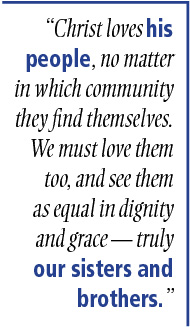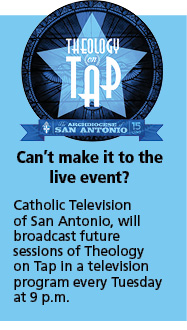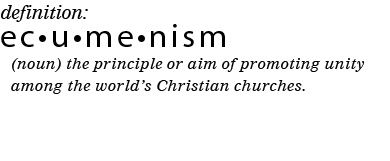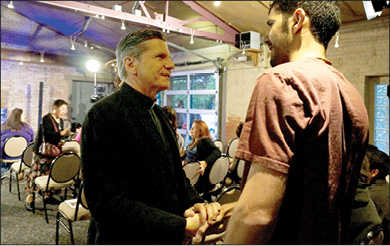The young adults in the room knew they were in for an interesting evening when the archbishop opened his presentation by saying, “We are here tonight, not to talk about some ‘nice’ work the Church is doing to bring people together. This is not some theoretical or sentimental conversation. This is a night to recognize something scandalous and serious. We are here to have a serious conversation. Are you ready?”
The scene was the Oct. 26 Theology on Tap gathering at the Blue Star Brewery. The speaker was Archbishop Gustavo García-Siller, MSpS, and his topic was, “Ecumenism: Relating to other faiths.”
“The Church is alive because the Holy Spirit lives within her,” said the archbishop. “Jesus formed his one Church, his own Body on earth, and sent the Holy Spirit to her to guide her in her mission.”
He explained that, a little over 50 years ago, the Holy Spirit spoke to the Church through the Second Vatican Council, and he invited listeners to hear the words the Spirit spoke through that Council: “The restoration of unity among all Christians is one of the principal concerns of the Second Vatican Council. Christ the Lord founded one Church and one Church only. However, many Christian communions present themselves to men as the true inheritors of Jesus Christ; all indeed profess to be followers of the Lord but differ in mind and go their different ways, as if Christ Himself were divided. Such division openly contradicts the will of Christ, scandalizes the world, and damages the holy cause of preaching the Gospel to every creature” (Unitatis Redintegratio — Decree on Ecumenism, 1).
“The Body of Christ has been damaged. Christians are not one, and we cannot rest until we are one again. Do you believe this?” the prelate paused. “We cannot have a serious conversation as Christians if we do not believe this fundamental truth of who we are as the Church.”
 Archbishop Gustavo strongly encouraged those present to read the Vatican II Decree on Ecumenism, Unitatis Redintegratio, and then listed the basic principles of ecumenism from that document:
Archbishop Gustavo strongly encouraged those present to read the Vatican II Decree on Ecumenism, Unitatis Redintegratio, and then listed the basic principles of ecumenism from that document:
Our divisions are not the fault of Jesus or of the faith, they are the fault of “people on both sides” of the different issues who let their pride rule instead of the Holy Spirit (c.f. #3).
“My brothers and sisters, ecumenism is an act of reconciliation and of conversion,” the archbishop stressed. “This conversion starts with us.”
The Missionary of the Holy Spirit reviewed a few other key principles to keep in mind. While we cannot share communion or have our liturgical rites in common yet, we should find ways to pray together and worship the Lord together (c.f. 8). We should be open to deepening our understanding and listen well to how our brothers and sisters understand their doctrines, resisting the urge to simply default to our own understanding (c.f. 9). There should be no “polemics” in theology or apologetics — no being argumentative for the sake of being argumentative (c.f. 10). We should “proceed with love and truth” (#11).
“We have so much common ground on which to build respectful and fruitful dialogue,” said the San Antonio prelate. “With these principles, we can carry out the work of ecumenism.”
Archbishop Gustavo also provided background on two distinct groups Catholics encounter in ecumenical work; the Eastern Christian churches and the ecclesial communities in the West.
The Eastern Churches are those like the Orthodox and Coptics with whom Catholics share much history, since the beginning of the Church. They share a liturgical tradition, authoritative structures, apostolic origins, and much more. The Decree on Ecumenism puts special emphasis on the relationship with these Churches, and many previous popes, continuing now with Pope Francis, have devoted special energy to ecumenism with the East.
In the West, the Church experienced a schism later than that which separated the Catholic Church from churches of the East. This break is commonly called the Protestant Reformation, and gave rise to groups like the Lutherans, Methodists, Baptists, and many other ecclesial communities.
“Our approach to these two main groups of East and West must recognize their differences. We can speak of liturgy more freely with the Greek Orthodox than we could to a Baptist,” the archbishop acknowledged. “We might focus on Scripture more with the Lutherans and more on history with the Coptics. Again, knowing the histories and doctrines of these groups is vitally important.”
Archbishop Gustavo reiterated that Catholics that Christ built his Church on Peter, and this not a belief we simply put aside in order to do ecumenism. “But it is necessary to purify ourselves of any elitism or superior feelings,” he continued. “Christ loves his people, no matter in which community they find themselves. We must love them too, and see them as equal in dignity and grace — truly our sisters and brothers.”
 Ecumenism vs. Interfaith dialogue
Ecumenism vs. Interfaith dialogue
The Alamo city ordinary clarified the distinction that dialogue with non-Christians is not called ecumenism but is interfaith dialogue, joking that “this is not just some nerdy distinction made by picky cardinals somewhere!”
Though still a work of reconciliation and conversion, interfaith dialogue is very different from Ecumenism. It even has its own document from Vatican II, Nostra Aetate, “Declaration on the Relationship of the Church with Non-Christian Religions.”
While ecumenical dialogue starts on the foundation of Jesus Christ, the Trinity, and baptism, interfaith dialogue starts on the foundation of divinity itself.
“As Christians, we believe in one God, so we trust that God is bringing those who do not believe in salvation in Christ Jesus to that truth. It is certain that we believe very differently than the others, but we can still share this core faith in a God who reaches out to us,” the archbishop said. “We share a special connection with those who call out to the God of Abraham, namely those of the Jewish faith and the Muslim faith. Many Christians struggle with the idea that these faiths worship the same God.”
It is the official teaching of the Catholic Church that “they adore the one God,” the God of Abraham, who we also adore (NA 3).
“They do not know him like we know him, but that does not mean they do not know and love the same God,” said Archbishop Gustavo. “This is where all our dialogues must start, trusting in the God who loves us all and is guiding us all along our pilgrim way.”
 He urged the young adults to learn as much as they can about these separated Christians, and about those of other faiths,” saying the more we know about each other, the easier it is to dialogue, and the harder it is to hold on to sinful and destructive mistrust. “May the sins and hurt done in the past not keep us trapped in prejudice,” he added.
He urged the young adults to learn as much as they can about these separated Christians, and about those of other faiths,” saying the more we know about each other, the easier it is to dialogue, and the harder it is to hold on to sinful and destructive mistrust. “May the sins and hurt done in the past not keep us trapped in prejudice,” he added.
The next session of Theology on Tap will be Thursday, Dec. 7, at Blue Star Brewery from 7-9 p.m with Auxiliary Bishop Michael Boulette to present on “The Year in Review: Where is God?”



